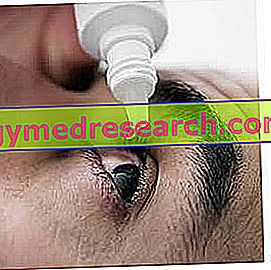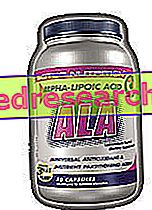Generality
Grapefruit is a subtropical citrus tree, cultivated for its fruits, originally known as "forbidden fruits" of Barbados.
Grapefruit was first documented in 1750 by Rev. Griffith Hughes, when he described some specimens from Barbados.

Grapefruit is the fruit of the Citrus Macf paradises tree
Any part of the fruit can be used, even if it is consumed mainly squeezed to obtain a thirst-quenching and vitaminic juice, with a bitter and sour taste.
Oils dedicated to aromatherapy can be extracted from grapefruit peel, in addition to a soluble dietary fiber.
The seed and the pulp, obtained as industrial by-products of the pressing, are normally sold as feed for livestock.
The alternative application of the seed concerns the production of the so-called grapefruit seed extract (GSE).
25 years ago Aubrey Hampton, founder of "Aubrey Organics", was the first to advertise the citrus seed extract he included in "Aubrey's Natural Preservative" (natural condom). Today, the GSE is marketed mainly in the health sector, both retail and on the internet.
What is the GSE?
GSE is the acronym of " Grapefruit Seed Extract ", an English term for grapefruit seed extract.
Specifically, it is a liquid extract, which can be obtained at home or in the laboratory by grinding grapefruit seeds and the pulp deprived of the juice; the slurry thus obtained must then be mixed together with glycerine (1).
At the industrial level, grapefruit seed extract is obtained by mixing seeds, pulp and glycerine (1); indicatively the glycerin represents 30-40% by weight of the product.
What is it used for?
Grapefruit seed extract has been the subject of pressing media campaigns, aimed at enhancing the alleged antibacterial, antiviral and antifungal properties.
Books entirely dedicated to this product have even been written and marketed, which is still driven by pressing advertising campaigns.
The absence of scientific evidence and the numerous reports of sophistication with synthetic preservatives, dangerous for human health, have only partially reduced the use of these claims for commercial purposes.
It is very distressing to see that most Italian websites continue to depict grapefruit seed extract as a "wonderful natural antibiotic", despite the absence of minimal scientific support.
The groundlessness of the "disinfectant" properties has been established, to advertise supplements based on grapefruit seed extract, an attempt is being made to give greater prominence to the alleged antioxidant properties and to the vitamin-mineral contribution.
Property and Effectiveness
What benefits do you attribute to grapefruit seed extract?
Grapefruit seed extracts are often advertised as an effective, useful natural remedy:
- for internal use against infectious diseases, such as candidiasis, salmonellosis, pharyngitis, ear infections and diarrhea;
- for external use against dermatological diseases on an infectious basis (acne, impetigo, etc.).
Numerous scientific investigations have excluded the timid preliminary evidence (2, 3, 4) about the presumed antibacterial, antiviral and antifungal activity of natural grapefruit seed extracts, bringing to light how this effect was to be attributed:
- the presence of ethyl alcohol in hydroalcoholic extracts (2) [alcohol being a known antiseptic, active against fungi, bacteria and most viruses (13)];
- to the addition of synthetic preservatives and / or antimicrobials, potentially dangerous for human health (1, 5, 6, 7, 8).
Antimicrobial properties of grapefruit seed extract
From the late 1990s (1) to at least 2008 (15), several researchers and various health authorities reported numerous episodes of contamination of grapefruit seed extracts with synthetic preservatives.
As can be appreciated from the documents disclosed by the Italian Ministry of Health (11) and the extensive bibliography at the end of the article, the most commonly found substance was benzethonium chloride .
The multiplicity of international reports, and the different origin of the different contaminated samples, suggests that the addition of synthetic preservatives was - rather than an isolated case - a fairly widespread practice.
Benzalkonium chloride is an antimicrobial commonly used in disinfectants and cleaning products. Some samples of seeds analyzed showed concentrations of benzalkonium chloride greater than 20% by weight (7.12), despite the known allergenicity and toxicity that this substance exerts at high doses. This is why the addition of such substances is not only a commercial fraud, but also a health fraud, as it can cause a series of problems for sensitive individuals.
In addition to benzalkonium chloride and benzethonium chloride, several studies (1, 7, 12) have reported contaminations with:
- methylparaben: a preservative widely used in the cosmetic field;
- triclosan: an antibiotic used in cosmetics not approved for oral intake.
The chemicals mentioned in this chapter are NOT present naturally in grapefruit seed extracts.
However, GSE-based products lacking these substances have also been shown to lack relevant antimicrobial activity (1, 5, 6, 7, 8, 14).
In this regard, the author of a study (9) on the effectiveness of alternative and complementary medicines expressed itself in these terms:
"Grapefruit seed extract is an example of quackery * when multiple studies demonstrate its universal antimicrobial effect is two to synthetic antimicrobial contamination " ( Grapefruit seed extract is an example of quackery *, when multiple studies show that its universal antimicrobial effect is due to contamination with synthetic antimicrobials).
* the term quackery, Italianized in "quackery", can be defined as "the promotion of fraudulent or ignorant medical practices" (10).
The media hype aroused by these reports has led many manufacturers to certify the absence of synthetic antimicrobials in their products.
An undoubtedly worthy behavior, respectful of the " Primum non nocere " principle that every supplement should embody.
It should also be noted that the reporting of cases of contamination in the literature stops at 2008; it is likely that the awareness of the problem and the attention paid by the health authorities in charge have helped to stem the phenomenon.
Antioxidant properties
Clarified that "the innumerable and widely known antimicrobial properties" of the natural extract of grapefruit seeds are scientifically unfounded, we pass to the analysis of the further properties commonly ascribed to this product.
In the extract of grapefruit seeds - as indeed in the whole fruit - various phytochemicals are found - such as flavonoids, limonoids and naringin - with potential health properties, in addition to citric acid, vitamins (such as C and E), and minerals.
Unfortunately, most of the products available online and in specialized shops simply report the content of flavonoids and (sometimes) that of vitamin C.
For example, the product "CitroBiotic BIO extract of grapefruit seeds" declares 45 mg of vitamin C and 4 mg of flavonoids per tablet, recommending the intake of two tablets a day. A discreet content that has nothing "miraculous", especially when compared to other products naturally rich in flavonoids or vitamin C.
Considering that some of these nutrients (primarily vitamin C) are thermolabile, oxidizable and photolabile, it is logical to expect that their concentration tends to decrease during product storage and when the container is opened and closed during use.
Considered:
- the absence of health properties confirmed by clinical studies;
- the ingredients and the origin of these products (we recall that the GSE is based on seeds and grapefruit pulp mixed together with glycerin);
it's really hard to understand why a person should prefer a GSE based supplement compared to a whole grapefruit fruit.
The latter, in addition to being more economical and genuine, is also considerably more satiating, more moisturizing and richer in pectin, a soluble fiber with interesting lipid-lowering properties.
| Grapefruit Whole Fruit | CitroBiotic BIO extract of grapefruit seeds | |
| 300g | 2 tablets | |
| Cost | 0.45 euros | 0.51 euro (price in an online store) |
| C vitamin | 120mg | 90mg |
Doses and Mode of Use
How to use grapefruit seed extract?
Grapefruit seed extract can be found mainly in the form of an alcohol solution.
We generally recommend 20 drops to be taken 3 times a day (total 60 drops), but the portion may change depending on the concentration of the product.
Side effects
Without prejudice to the absence of synthetic antimicrobial substances and the interaction with any drugs taken by the patient, the intake of grapefruit seed extract, at dosages commonly recommended by the producers, is generally well tolerated and can be considered free of side effects clinically relevant.
Contraindications
When should grapefruit seeds not be used?
Notwithstanding that, as we have anticipated, grapefruit seed extract is a product at least questionable, it is also necessary to emphasize that its intake should be avoided in the event of:
- Sensitive drug therapies (see below)
- Hepatic, renal and nerve disorders
- Pregnancy
- Feeding time
- Allergy to the components of grapefruit seeds
- Benzalkonium chloride allergy.
Contraindications
Pharmacological Interactions
Grapefruit juice interacts with numerous drugs.
Less than 250 ml of grapefruit juice may change the metabolism of some drugs. This effect has been observed both with the whole fruit and its juice, therefore caution should be used with both and also with the intake of grapefruit seed extracts.
Below is a table with the most studied drug interactions (for the bibliography click here); those wishing to learn more about the subject can consult the article: Grapefruit and Drugs - Drug Interactions
| Table. Possible interactions between grapefruit juice (*) and drugs metabolised by CYP3A4 | ||||
| Pharmacological class | Drug | Possible adverse events | Increased oral bioavailability | Action to be taken |
| antiarrhythmics | Amiodarone | arrhythmias | Yup | Avoid the juice |
| quinidine | Nobody | No | None | |
| Antibiotics | Clarithromycin | Nobody | No | None |
| Antihistamines | terfenadine | Yup | Avoid the juice | |
| anxiolytics | Buspirone | Psychomotor performance reduction, sedation increased | Yup | Avoid the juice |
| Diazepam | Increase in sedation | Yes | Avoid the juice | |
| Midazolam | Increase in sedation | Yes | Avoid the juice | |
| triazolam | Increase in sedation | Yes | Avoid the juice | |
| Calcium channel blockers | Amlodipine | Tachycardia, hypertension | Yup | Avoid the juice |
| Felodipine | Tachycardia, hypertension | Yup | Avoid the juice | |
| Nifedipine | Tachycardia, hypertension | Yup | Avoid the juice | |
| Nimodipine | Tachycardia, hypertension | Yup | Avoid the juice | |
| Diltiazem | Nobody | No | None | |
| Verapamil | Nobody | No | None | |
| Corticosteroids | Ethinyl estradiol | Not known | Yup | Monitor adverse effects |
| Progesterone | Not known | possible | Monitor adverse effects | |
| Prednisone | Nobody | No | None | |
| Statins | Atorvastatin | Myopathy, headache, rhabdomyolysis | Yup | Avoid the juice |
| Lovastatin | Myopathy, headache, rhabdomyolysis | Yup | Avoid the juice | |
| Pravastatin | Myopathy, headache, rhabdomyolysis | Yup | Avoid the juice | |
| Simvastatin | Myopathy, headache, rhabdomyolysis | Yup | Avoid the juice | |
| HIV protease inhibitors | Saquinavir | Not known | Yup | Monitor adverse effects |
| Immuno - suppressors | Cyclosporine | Liver dysfunction, immuno-suppression increase | Yup | Avoid the juice |
| Tacrolimus | Liver dysfunction, immuno-suppression increase | Yup# | Avoid the juice | |
| neuropsychiatric | Carbamazepine | Drowsiness, ataxia, nausea | Yup | Avoid the juice |
| Clomipramina | Drowsiness, depres. respiratory | Yup | Monitor adverse effects | |
| Phenytoin | Nobody | No | None | |
| More | carvedilol | Bradycardia, hypotension | possible | Monitor adverse effects |
| Methadone | Depres.respiratoria, hypotension | possible | Monitor adverse effects | |
| Sildenafil | Headache, flushing, dyspepsia | possible | Monitor adverse effects | |
| Theophylline | Nobody | No | None | |
| Warfarin | Nobody | No | None | |
| * Grapefruit juice and whole fruit # Unknown clinical importance | ||||
Precautions for Use
What do you need to know before taking grapefruit seed extract?
In addition to what was mentioned in the paragraphs on side effects, contraindications and pharmacological interactions, it is worth remembering that the possible presence of benzalkonium chloride may have atypical side effects:
- On contact, it can irritate the skin, mucous membranes and eyes
- In the rat, at doses of about 240 mg / kg of weight, it becomes acute toxic. This information, which does not affect the reasonable use of grapefruit seed extract, is instead necessary to remember to keep this supplement out of the reach of children. Accidental ingestion in excessive doses could seriously harm the health of children.
- It is an aquatic pollutant, which is why it is advisable not to dispose of the product by throwing it in the toilet.
Bibliography



